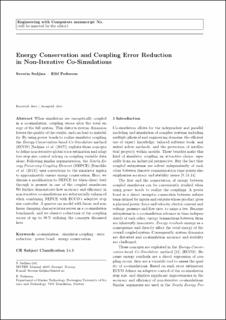| dc.contributor.author | Sadjina, Severin Simon | |
| dc.contributor.author | Pedersen, Eilif | |
| dc.date.accessioned | 2020-04-20T12:57:13Z | |
| dc.date.available | 2020-04-20T12:57:13Z | |
| dc.date.created | 2019-07-30T12:17:12Z | |
| dc.date.issued | 2019 | |
| dc.identifier.citation | Engineering with Computers. 2019, 1-9. | en_US |
| dc.identifier.issn | 0177-0667 | |
| dc.identifier.uri | https://hdl.handle.net/11250/2651707 | |
| dc.description.abstract | When simulators are energetically coupled in a co-simulation, coupling errors alter the total energy of the full system. This distorts system dynamics, lowers the quality of the results, and can lead to instability. Using power bonds to realize simulator coupling, the Energy-Conservation-based Co-Simulation method (ECCO) (Sadjina et al. Eng Comput 33(3):607–620. https://doi.org/10.1007/s00366-016-0492-8, 2017) exploits these concepts to define non-iterative global error estimation and adaptive step size control relying on coupling variable data alone. Following similar argumentation, the Nearly Energy Preserving Coupling Element (NEPCE) (Benedikt et al. Nepce—a nearly energy preserving coupling element for weak-coupled problems and co-simulation. In: V International conference on computational methods for coupled problems in science and engineering, coupled problems, pp 1021–1032. International Center for Numerical Methods in Engineering, 2013) uses corrections to the simulator inputs to approximately ensure energy conservation. Here, we discuss a modification to NEPCE for when direct feed-through is present in one of the coupled simulators. We further demonstrate how accuracy and efficiency in non-iterative co-simulations are substantially enhanced when combining NEPCE with ECCO’s adaptive step size controller. A quarter car model with linear and nonlinear damping characteristics serves as a co-simulation benchmark, and we observe reductions of the coupling errors of up to 98% utilizing the concepts discussed here. | en_US |
| dc.language.iso | eng | en_US |
| dc.publisher | Springer | en_US |
| dc.title | Energy conservation and coupling error reduction in non-iterative co-simulations | en_US |
| dc.type | Peer reviewed | en_US |
| dc.type | Journal article | en_US |
| dc.description.version | acceptedVersion | en_US |
| dc.source.pagenumber | 1-9 | en_US |
| dc.source.journal | Engineering with Computers | en_US |
| dc.identifier.doi | 10.1007/s00366-019-00783-4 | |
| dc.identifier.cristin | 1713183 | |
| dc.description.localcode | This is a post-peer-review, pre-copyedit version of an article. Locked until 30.5.2020 due to copyright restrictions. The final authenticated version is available online at: https://doi.org/10.1007/s00366-019-00783-4 | en_US |
| cristin.unitcode | 194,64,20,0 | |
| cristin.unitname | Institutt for marin teknikk | |
| cristin.ispublished | true | |
| cristin.fulltext | original | |
| cristin.qualitycode | 1 | |
